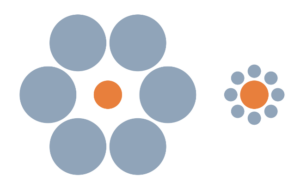We are social creatures who all want to belong. The catch: a side effect of this tendency is that we often consciously and/or unconsciously size ourselves up in relation to those around us – in fact it’s nearly impossible to not do. Whether it be our social media feeds, those we see on our favorite tv shows, or our coworkers – we are bombarded with reference points that give us a sense of how good, pretty, accomplished, etc. we are (or are not). Talk about a mental health mindfield!
Engaging in social comparisons can significantly impact mental health, often with detrimental effects. When individuals measure their own worth against the successes and attributes of others, it can lead to a pervasive sense of inadequacy, triggering feelings of low self-esteem and depression. The relentless scrutiny and juxtaposition can result in chronic stress, as people struggle with the pressure to match an often-unattainable social standard. Such comparisons can skew personal expectations, leading to an endless pursuit of self-assessment, validation, and perfection, which paradoxically seems to recede further with every achievement. The erosion of self-contentment is one of the most insidious consequences, as joy is frequently overshadowed by a persistent sense of not measuring up.
The pervasive influence of social media platforms amplifies this effect by presenting a constant stream of curated lives that are seemingly perfect, exacerbating feelings of envy and dissatisfaction. The digital age has thus ushered in a new frontier for social comparison, where the benchmarks of comparison are often unrealistic portrayals of life, heightening the sense of personal inadequacy. Moreover, the negative bias of human psychology means that people tend to fixate more on others’ accomplishments rather than their own, disregarding their progress and achievements.
The impact on mental health is compounded by the fact that social comparisons can lead to an undermining of one’s authentic self. It can shift focus from intrinsic goals—those that bring internal satisfaction—to extrinsic ones, driven by external validation. This shift can dampen intrinsic motivation and reduce overall happiness. Social comparisons can also disrupt interpersonal relationships — negative feelings such as envy and resentment seep into interactions with peers perceived as more successful or fortunate. The resulting social isolation can further deteriorate mental well-being.
Don’t believe me, let’s try an experiment. Which of the following middle circles is larger?

Did you say the right one? You are not alone, but the actual answer is they are the same.
The right circle seems bigger only because the reference points are smaller circles compared to the surrounding circles on the left image.
As the saying goes, comparison is the thief of joy. Want to get nerdy? Read this study suggesting happier people avoid social comparison more.
And meanwhile, here are 14 tips to help you avoid falling into the trap of social comparison:
- Focus on Your Own Goals: Define what success means to you personally, not by what others deem important. Pursue your own objectives and set personal milestones.
- Practice Gratitude: Every day, take some time to reflect on the things you are thankful for in your life. Gratitude shifts your focus from what you lack to what you already possess.
- Recognize Your Unique Path: Understand that everyone is on a unique journey, with different starting points, challenges, and opportunities. Your path is not meant to mirror anyone else’s.
- Use Comparison as Motivation, Not a Measurement: If you find yourself comparing, try to use it constructively. Let others’ successes inspire you rather than serve as a yardstick for your worth.
- Limit Social Media: Social media often portrays an idealized version of life that is not realistic. Limit your exposure to these platforms if you find they trigger comparison.
- Celebrate Others’ Success: Instead of feeling envious, try to genuinely feel happy for others when they achieve something. This can help foster a sense of community and shared joy rather than competition.
- Develop Self-Compassion: Be kind to yourself. Understand that everyone has strengths and weaknesses, and making mistakes or facing setbacks is part of being human.
- Reflect on Your Accomplishments: Regularly remind yourself of your own achievements and progress, no matter how small they might seem.
- Embrace Imperfection: Accept that imperfection is a natural part of life. Instead of striving to be better than others, aim to be the best version of yourself. Individual differences are what makes us unique!
- Mindfulness and Meditation: Practices like mindfulness and meditation can help you stay centered and focused on the present, reducing the urge to look sideways.
- Surround Yourself With Positive Influences: Spend time with people who encourage you and reinforce your positive qualities rather than those who foster an environment of comparison and competition.
- Help Others: When you help others, you often forget about your own need to compare. It can also provide perspective on what really matters.
- Detach From Materialistic Values: Try to minimize the importance of material possessions as a source of happiness or status. This can reduce the tendency to compare financial success or belongings.
- Seek Professional Help if Necessary: If social comparison is deeply affecting your mental health, consider talking to a therapist or mental health counselor.
All in all, social comparison can be a gnarly little brain trap that more often than not makes us feel bad about ourselves. By recognizing this tendency, and implementing some simple strategies, you can fight social comparison and accept the wonderful person you are.
*If you or someone you love is struggling with mental health, request an appointment with one of our professional mental health providers at Diversus Health today. If you need immediate assistance, call our crisis hotline at 844-493-8255, or text ‘TALK’ to 38255.